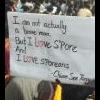Search the Community
Showing results for tags 'religion'.
-
I am wonder whether the CHIJ primary schools allows children of different religion? I remember the Maha allows non Buddhist children. Are there selection criteria differ from other primary schools? I don't intend to talk too much about religion, just some research for buying a house for overseas friends.
- 27 replies
-
- 2
-

-
By mean of fault lines, I am not referring to NSL, EWL, NEL, CCL, DTL, etc. (we are seeing less service disruption lately right?) Neither am I referring to any new geographical discovery that might put us at risk of natural disasters such as earthquake or volcano eruption, but... Majority now aware of race, religious issues, but study flags new fault lines A large majority of Singaporeans are aware of the seriousness of race and religious issues, and feel the Government has done enough to manage these divisions. But fault lines have emerged on class, immigration and lesbian, gay, bisexual and transgender (LGBT) rights, where more Singaporeans, especially younger ones, want to see greater state involvement and public discourse. These emerging issues, if mismanaged, are also seen to affect Singaporeans' trust in the Government the most, compared with race and religion. These and other findings from a study of public opinion on fault lines in Singapore, carried out by the Institute of Policy Studies (IPS), were released yesterday. Besides Dr Mathews, the other researchers were IPS research associate Melvin Tay and research assistant Shanthini Selvarajan. Based on a survey of about 4,000 citizens and permanent residents last year, the study noted that about a third of the respondents identified race and religion as having the potential to result in violence in Singapore if not managed properly - significantly more so than class, immigration and LGBT issues. Yet only about a quarter tied race and religion to trust in the state and politicians, compared with almost 40 per cent who said trust levels in the Government would likely fall if class and immigration issues are mismanaged. Close to half of both younger and older respondents felt there should be more state involvement in immigration, reflecting possible higher levels of xenophobia and job insecurity in recent times, regardless of age, said the researchers. These results could mean that citizens now accord the Government more responsibility to do more to manage class differences and immigration issues, they added. "People may feel that the Government already has clear policies and frameworks that are fairly robust when it comes to race and religion. But perhaps for immigration, socio-economic status and LGBT issues, people might want the state to be more involved in managing those issues," said IPS senior research fellow Mathew Mathews. This is unlike in the early years after independence, when the focus was on surviving communal politics. YOUTH LESS KEEN ON MORE GOVT INTERVENTION ON RACE AND RELIGION Just over a fifth of young people aged between 18 and 25 surveyed wanted more state involvement in race issues, compared with one-third of those aged above 65. Similar results were observed for religion. This could be due to the lived experiences of the older generation, who experienced the Maria Hertogh and 1964 race riots, said researchers. The former took place in 1950, after a court decided that a child who had been raised by Muslims should be returned to her Catholic biological parents. In 1964, clashes took place between the Malays and Chinese amid rising ethnic and political tensions. For older Singaporeans, these events drove home the need for a robust state apparatus to intervene and keep the peace, added the researchers. Significantly more Malays and Indians (about 40 per cent each) wanted greater state involvement in race issues than Chinese (24 per cent) - a sign that ethnic minorities are more likely to perceive or experience discrimination than the majority. A similar trend was seen for religion. In addition, people of minority races with a university degree and above desired more state intervention than their less-educated counterparts, showing that increased education results in greater awareness of, and desire to resolve, racial and religious issues, said the study. MINORITY RACES, YOUTH MORE LIKELY TO PROBE POTENTIAL DISCRIMINATION When asked how they would respond after getting an e-mail or phone message that a business had refused to serve people from a certain race or religion, nearly half of both Malays and Indians said they were likely to investigate the issue, compared with 37 per cent of Chinese. About 30 per cent each of Malays and Indians were also more likely to take the allegation seriously by reporting it to the authorities, compared with 13 per cent of Chinese. Younger Singaporeans would also be more proactive in tracing the source of such a message, with two-thirds saying they would check with their friend who sent it, compared with only half of respondents aged 65 and above. This could be because younger people aged 18 to 25 are more sensitive and concerned about discrimination. Being digital natives, they are likely to investigate matters further, said the study. Overall, the study showed that an overwhelming 92 per cent of respondents believed the Government had done well to improve racial and religious harmony. An example of vigorous state intervention to combat social divides, it said, can be seen in the area of religion - where a range of hard and soft legislation like the Internal Security Act, Maintenance of Religious Harmony Act, and the Inter-Racial and Religious Confidence Circles has prevented potential discord and wider conflict. But while seven in 10 aged above 65 agreed that the Government is responsible for racial and religious harmony in Singapore, only half of respondents aged 18 to 25 felt this way, it added. The researchers said this shows older Singaporeans may attribute greater responsibility to the state, or believe these fault lines are most effectively managed by strong government intervention. But going forward, younger generations could prefer a more community-driven approach to race and religion. Aiyah, why waste time and $$$ to conduct such survey, just sit at neighborhood coffee shop, food court, or even surfing HWZ, MCF, etc. will get you the same results. May I add that this is a typical example of people at the top loosing touch with people on the ground...
- 69 replies
-
- 19
-

-
- fault lines
- singapore
- (and 11 more)
-
YANGON: A Dutch tourist has been detained in Myanmar for insulting religion after being accused of pulling the plug on a speaker relaying a late-night Buddhist sermon in Mandalay. Klass Haytema, 30, has been held since Friday (Sep 23) night when he allegedly disconnected the cable linking an amplifier and a speaker at a hall playing the sermon after he complained that it was disturbing him, police said. "The religious hall is not far from the hotel where he was staying... he said he did it because it was too noisy for him," Kyi Soe, police chief at Maha Aung Myay township, told AFP. An angry crowd followed the man back to his hotel, where he was taken into custody by police and later transferred to a Mandalay prison. "We detained him for insulting religion," he said, adding it was under section 295 of Myanmar's penal code. He is yet to be charged but the law carries up to a two year jail term and fine. Buddhist-majority Myanmar is deeply devout and several foreigners have been found guilty of insulting religion. In July a Spanish tourist was deported from Myanmar after monks complained about a tattoo of Buddha he had on his leg. Last year a New Zealand bar manager spent 10 months in jail for "insulting religion" by using a Buddha image to promote a cheap drinks night. Buddhist nationalism has surged in Myanmar in recent years, with the country's Muslim minority -- around five percent of the population -- facing particular pressure. - AFP http://www.channelnewsasia.com/news/asiapacific/dutchman-held-in-myanmar-after-pulling-plug-on-buddhist-sermon/3157058.html
-
Well....so I got to know this nice girl through a friend. She's awfully sweet and kind. The kind that would make a decent wife & gf: intelligent enough to have a decent conversation etc etc....and I like her. But...now the problem comes. I'm not much of a religion person..maybe go to the temple once awhile with my parents who are buddhist. But she has been a christian since the day she was born...and she's pretty into it. She helps out at a church's children choir every week too... Do you guys think I should continue dating her? Despite knowing that it will be a problem in the future? Her parents want a guy that is a christian for their daughter...and MY parents wants a daughter-in-law thats NOT a christian..... Funny how such things matter in our ADVANCED society.....sigh... comments?
-
http://www.mosnews.com/society/2009/04/13/shortskirtt/ The main point of this story is the pic shown in the article.... [nosebleed] :wub: i like...... [laugh]
-
see the increase they are been hit.... -------------------------------------------------------------------- Protesting monks hold Yangon officials hostage The security men were freed after abbot stepped in to end stand-off YANGON - SEVERAL hundred monks staged a demonstration in Myanmar on Wednesday in an escalation of the ongoing protests against massive fuel price increases, eyewitnesses said. And yesterday, the monks took about 20 officials of Myanmar's security forces hostage inside their monastery. The hostages were freed after a few hours when a senior abbot intervened to end the tense stand-off. The protesting monks numbered between 300 and 500 people, the eyewitnesses said. The monks also burnt at least four cars belonging to the officials in yesterday's incident, a resident said. 'Bystanders cheered as monks torched the cars one by one, but monks have told laymen that they will take care of the matter themselves,' he said. Police and firemen did not respond immediately to the torching of the vehicles. The officials who were held hostage had gone to the so-called Middle Monastery in the town of Pakokku, 600km north-west of Yangon, to apologise over an incident on Wednesday in which soldiers fired shots over the heads of protesting monks, a witness said. The officials had also gone to the monastery to ask the abbot to stop monks - who are highly revered in Buddhist Myanmar - from taking part in the sporadic marches that have broken out in the past two weeks, the witness added. Witnesses spoke on condition of anonymity for fear of official retaliation. The intervention by the troops was the first time they had been called in during two weeks of rare public dissent. More than a hundred people have been arrested in the crackdown on protesters, who took to the streets after a fuel price hike last month of as much as 500 per cent. Pakokku is a centre for Buddhist learning, with more than 80 monasteries, including at least 15 that are used for teaching. There are an estimated 35,000 monks in the town. Intervening against monks in Pakokku is particularly risky for the ruling junta as the town is only about 130km from the country's second largest city of Mandalay. Historically, monasteries have played a major role in political uprisings, both in 1988 and in revolts against then-Burma's colonial master Britain. Wednesday's march by the monks came in the third week of the wave of public protests in the tightly controlled country. A handful of monks were arrested, but most retreated to their monasteries. Before this, the military had responded by arresting leading dissidents and sending pro-junta gangs onto the streets of Yangon to break up protests. A resident of Mandalay said the atmosphere in the city was very tense. News reports from dissident organisations suggest the generals who first seized power in 1962 have been pressing the heads of Mandalay's monasteries not to become involved. 'They seem to be more nervous. Once the monks in Mandalay start to rise, they will not be able to control it,' a Yangon-based politician said this week.



